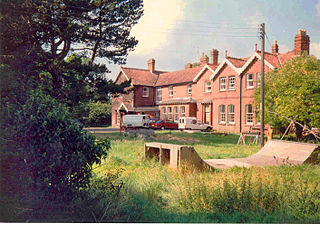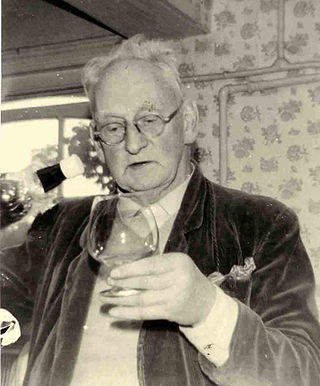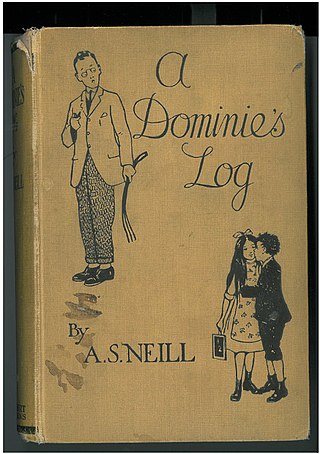
Summerhill School is an independent boarding school in Leiston, Suffolk, England. It was founded in 1921 by Alexander Sutherland Neill with the belief that the school should be made to fit the child, rather than the other way around. It is run as a democratic community; the running of the school is conducted in the school meetings, which anyone, staff or pupil, may attend, and at which everyone has an equal vote. These meetings serve as both a legislative and judicial body. Members of the community are free to do as they please, so long as their actions do not cause any harm to others, according to Neill's principle "Freedom, not Licence." This extends to the freedom for pupils to choose which lessons, if any, they attend. It is an example of both democratic education and alternative education.
Truancy is any intentional, unjustified, unauthorized, or illegal absence from compulsory education. It is a deliberate absence by a student's own free will and usually does not refer to legitimate excused absences, such as ones related to medical conditions. Truancy is usually explicitly defined in the school's handbook of policies and procedures. Attending school but not going to class is called internal truancy. Some children whose parents claim to homeschool have also been found truant in the United States. In some schools, truancy may result in not being able to graduate or to receive credit for classes attended, until the time lost to truancy is made up through a combination of detention, fines, or summer school.
Alternative education encompasses many pedagogical approaches differing from mainstream pedagogy. Such alternative learning environments may be found within state, charter, and independent schools as well as home-based learning environments. Many educational alternatives emphasize small class sizes, close relationships between students and teachers and a sense of community.

Alexander Sutherland Neill was a Scottish educator and author known for his school, Summerhill, and its philosophy of freedom from adult coercion and community self-governance. Raised in Scotland, Neill taught at several schools before attending the University of Edinburgh in 1908–1912. He took two jobs in journalism before World War I, and taught at Gretna Green Village School in the second year of the war, writing his first book, A Dominie's Log (1915), as a diary of his life there as head teacher. He joined a Dresden school in 1921 and founded Summerhill on returning to England in 1924. Summerhill gained renown in the 1930s and then in the 1960s–1970s, due to progressive and counter-culture interest. Neill wrote 20 books. His top seller was the 1960 Summerhill, read widely in the free school movement from the 1960s.

Sex segregation, sex separation, gender segregation or gender separation is the physical, legal, or cultural separation of people according to their biological sex at any age. Sex segregation can refer simply to the physical and spatial separation by sex without any connotation of illegal discrimination. In other circumstances, sex segregation can be controversial. Depending on the circumstances, it can be a violation of capabilities and human rights and can create economic inefficiencies; on the other hand, some supporters argue that it is central to certain religious laws and social and cultural histories and traditions.

An extracurricular activity (ECA) or extra academic activity (EAA) or cultural activities is an activity, performed by students, that falls outside the realm of the normal curriculum of school, college or university education. Such activities are generally voluntary (as opposed to mandatory), social, philanthropic, and often involve others of the same age. Students and staff direct these activities under faculty sponsorship, although student-led initiatives, such as independent newspapers, are very common. However, sometimes the school principals and teachers also bring in these activities in the school among the students.

Democratic education is a type of formal education that is organized democratically, so that students can manage their own learning and participate in the governance of their school. Democratic education is often specifically emancipatory, with the students' voices being equal to the teacher's.
R F Mackenzie (1910–1987), a Scottish educationalist and headteacher, was one of the most original and controversial thinkers in 20th century Scotland.
Homer Lane (1875–1925) was an American-born educator who believed that the behavior and character of children improved when they were given more control over their lives. Bertrand Russell called him "one of the best men of his generation".
The Circle of Friends approach is a method designed to increase the socialization and inclusion of a disabled person with their peers. A Circle of Friends consists of a "focus" child, for whom the group was established, six to eight classroom peers, and an adult facilitator who meet once weekly to socialize and work on specific goals. Most available resources about the Circle of Friends approach are geared toward its use with school-aged children with various difficulties.
Anarchism has had a special interest on the issue of education from the works of William Godwin and Max Stirner onwards.

Summerhill: A Radical Approach to Child Rearing is a book about the English boarding school Summerhill School by its headmaster A. S. Neill. It is known for introducing his ideas to the American public. It was published in America on November 7, 1960, by the Hart Publishing Company and later revised as Summerhill School: A New View of Childhood in 1993. Its contents are a repackaged collection from four of Neill's previous works. The foreword was written by psychoanalyst Erich Fromm, who distinguished between authoritarian coercion and Summerhill.
The free school movement, also known as the new schools or alternative schools movement, was an American education reform movement during the 1960s and early 1970s that sought to change the aims of formal schooling through alternative, independent community schools.
The Free School is the oldest independent, inner-city alternative school in the United States. Founded by Mary Leue in 1969 based on the English Summerhill School philosophy, the free school lets students learn at their own pace. It has no grades, tests, or firm schedule: students design their own daily plans for learning. The school is self-governed through a weekly, democratic all-school meeting run by students in Robert's Rules. Students and staff alike receive one equal vote apiece. Unlike Summerhill-style schools, the Free School is a day school that serves predominantly working-class children. Nearly 80 percent of the school is eligible for reduced-price meals in the public schools. About 60 students between the ages of three and fourteen attend, and are staffed by six full-time teachers and a number of volunteers.
Fifty Years of Freedom: A Study of the Development of the Ideas of A. S. Neill is a 1972 intellectual biography of the British pedagogue A. S. Neill by Ray Hemmings. It traces how Homer Lane, Wilhelm Reich, Sigmund Freud and others influenced Neill as he developed the "Summerhill idea", the philosophy of child autonomy behind his Summerhill School. The book follows Neill's early life and career in rural, Calvinist Scotland and continues through the influence of his mentors, Lane and Reich, and the origins of Summerhill after World War I. Written fifty years from Summerhill's founding, Fifty Years is a sociological and historical analysis of Neill's ideas in the context of intellectual and educational trends both during Neill's life and at the time of publication. Hemmings also surveyed progressive school leaders about Neill's impact on the field, and reported their perception of influence on teacher–pupil relations. Fifty Years was first published in England in 1972 by George Allen and Unwin, and was later renamed Children's Freedom: A. S. Neill and the Evolution of the Summerhill Idea for its 1973 American publication by Schocken Books.

A.S. Neill's A Dominie's Log is a diary of his first year as headteacher at Gretna Green Village School, during 1914-15. It is an autobiographical novel. He changed a hard working, academic school controlled by corporal punishment and the fear of the authority of the teacher into one of happiness, play and children controlling their learning. He was a reflective teacher, sitting on his desk thinking out why he and the children were at the school. He also, most importantly, thought the children were human beings, and engaged with them as such, joining in their games, sliding with them on an ice slide in the street, sharing their sweets, laughing with them, and appreciating and respecting their individuality, and creativity.
Girl child labour in Nigeria refers to the high incidence of girls aged 5–14 who are involved in economic activities outside education and leisure. The prevalence of girl child labour in Nigeria is largely due to household wealth, but other factors include: the educational accomplishment of parents, peer pressure and demand factors such as high demand for domestic help and sex workers all contribute to the high incidence of girl child labour in the country. In addition, in many rural and Muslim communities in Northern Nigeria, children are sometimes asked to aid religiously secluded women or mothers in running errands.
The New Unified School Council was an education institution that was created on July 27, 1936 in Barcelona.
The Collaberg School founded in 1961 was the first 'free school' in the United States based on the model of the Summerhill School in England. The school was located in Stony Point, 30 miles (48 km) from New York City. Collaberg School enrolled between 25 and 50 students from kindergarten through high school in its experimental curriculum. The school closed in 1970 but during its short lifespan was a touchpoint for many of the notable figures of the burst of creative energy that was the 1960s.







